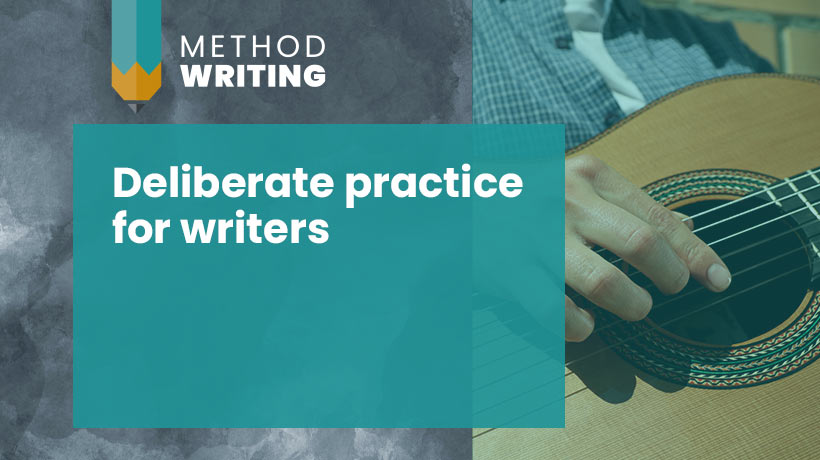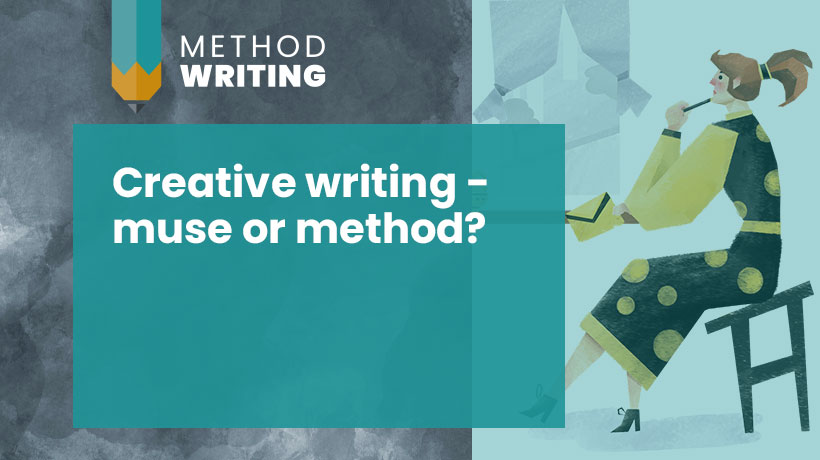Deliberate practice writing – how to improve your technique faster
Deliberate practice writing is a fast, effective way to improve. Just as musicians practise scales and golfers practise their swing systematically, writers, too, can practise the nuts and bolts of craft.
It’s easy to do, too. Simply break your process down into steps, and repeat those small elements until they feel familiar and natural. By using repetition like this, you can
- Analyse powerful writing techniques
- Learn writing tricks used by your favourite authors
- Solve craft and process problems.
Imagine! Deliberate practice writing experiments can help you to study how Stephen King creates pace and tension. How Shakespeare paints word-pictures. How John Le Carre handles time.
Those are just some of the writers whose strategies I’ve studied and practised. Even though I just do this occasionally, it has really helped me to build my toolkit of creative writing techniques.
Learn to write like a musician learns an instrument
I’m always amazed to hear of aspiring writers who dive into writing 100k-word novels when they’ve not yet written an effective short story, or even a paragraph!
I tried this, and it didn’t work. I didn’t know what I was doing, and very quickly ran out of steam. In fact, I literally lost the plot.
Of course, if you’ve done this and got to the end of a passable novel draft, congratulations!
But if you haven’t, don’t despair. In my view, it’s perfectly natural to botch a symphony when you’ve never played an eight-bar melody.
An aspiring musician would never dream of trying to play a whole piece when they’ve never played a note, a chord, a scale.
Musicians accept that you need to learn gradually, put one foot in front of the other, build your skills on a good foundation.
So what’s the equivalent in writing?
Well, deliberate practice writing can be anything you want to be. Simply choose a very specific issue, and create an exercise around it.
Here are some examples.
How to use deliberate practice to grow your vocabulary
Say you’re prone to overusing certain adjectives. Most writers get stuck in grooves and have their own favourites.
In fact, it’s possible to identify a writer by their fingerprint – a bit like a writer’s DNA. According to journalist Ben Blatt, Nabokov’s favourite word is mauve.
So, design a creative writing exercise to expand your range of adjectives. How?
You might:
- Go through a favourite book and harvest words you like but never use.
- Use a thesaurus to find close synonyms to substitute for your favourites.
- Highlight the adjectives in your chapter and try out less obvious ones.
Or use a combination of these approaches.
Even 5-10 minutes a day of this kind of writing technique practice will help you to focus in on the issue, and alert you to other possibilities.
How to handle time and pace more effectively with deliberate practice writing
I’ve done this with several thriller authors I enjoy, and it’s helped me to write more flexibly, and create a more vivid sense of time.
So, how can you do this?
- Go through a novel chapter and highlight temporal phrases or words.
- Harvest these sentences.
- Write new sentences that use just the sentence structure.
I did this with a John Le Carre novel and realised he uses some fascinating strategies for time. He uses tenses in a way that creates a sense of background action when new scenes begin. It means his characters hit the ground running, and readers enjoy a sense of forward momentum.
How to learn authors’ signature techniques
I did this with a Stephen King novel, and discovered he has an intriguing way of using negatives in description.
He also shunts adjectives together to make compound adjectives, a bit like in German. He uses powerful, action-oriented verbs that help to create momentum in his writing.
How to do this:
- use a highlighter to mark up style tics that strike you.
- Group them according to type or strategy.
- Work out exactly what’s going on – what the components are.
- Write examples that emulate this technique.
Note: this isn’t copying. It’s modelling writing technique. In the same way that art students sit in art galleries and copy famous paintings, to study the artist’s brushstrokes, you can closely study a writer’s style.
Is deliberate practice writing just avoiding the real work?
Not at all. By isolating problems, experimenting and then practising, you can solve them much faster.
Musicians do exactly this. Some groups of notes are simple to play, others much harder. A musician will sometimes isolate a small grouping and play it for hours, round and round. Over time, muscle memory will kick in and it will eventually flow far more easily.
I tried this with hula hooping! I wanted to learn counterclockwise and left-handed hooping, and for a few days, stopped all clockwise practice, and right-hand practice. They were my default comfort zones. It wasn’t easy, but it worked! In no time, I doubled my range of technique.
How might you apply this to writing?
Identify your writing comfort zones.
- Maybe you always write very slowly, or very fast?
- Do you prefer first person, or third?
- Are you good at writing dialogue, but don’t love description?
- Do you always write in the same place?
Choose something that limits you, and devise some experiments to teach yourself how to expand your range. You might decide to:
- spend an hour a day for a week practising only that weak spot.
- collect examples of how other writers handle it, and emulate their techniques.
- do this for a few days until you have greater ease with the issue.
I once spent 100 days writing super-short flash fiction stories, to explore the feeling of writer’s block. I wanted to get used to the sensation of diving in and not knowing where I was heading. Each story took five minutes a day, so it wasn’t a great time commitment. The important element was the regular practice.
The experiment was extremely helpful. Over time, it demystified the fear of starting – something called “threshhold fear” or Schwellenangst in German. I realised that stories are everywhere. Happily, I can now simply push those feelings aside. The stories have been published, too!
But the overall point isn’t to become an expert in something you’re not very good at.
Rather, it’s to expand your technical range, to give you greater flexibility.
Like powerful new tools for your writer toolkit!
Comfort zones and the power of stretching
In his book Bounce, Matthew Syed suggests that the most effective way to improve is to practise in the painful zone just outside the edge of your ability.
In other words, if you constantly stretch just a bit beyond your capabilities, you’ll learn faster.
Of course, this is mighty hard work, which is why most people don’t do it. They prefer to practise the same thing over and over again. Just as an amateur guitarist enjoys playing the same old songs time after time. They’re good at them! They make a good sound.
But that’s just repetition. It’s not expanding their range.
It’s not deliberate practice.
However, if you’re constantly practising at the outer reach of your ability, you’ll sound pretty awful. You’ll make mistakes. You’ll probably feel a sense of frustration or failure. But by giving yourself permission to practise and fail, you’ll eventually improve.
Your previous outer limit will expand. You’ll wonder why you ever found it so difficult. And then you’ll need to find a new challenge.
Over to you
So, that’s deliberate practice writing in a nutshell. I find it really helpful, as it’s helped me to learn tricks from some of my favourite writers, and conquer a few demons. It’s a good way to demystify writing and overcome a no-show muse!
Your writing issues will be different. Try some of the exercises above, and then create your own.
What do you discover?


